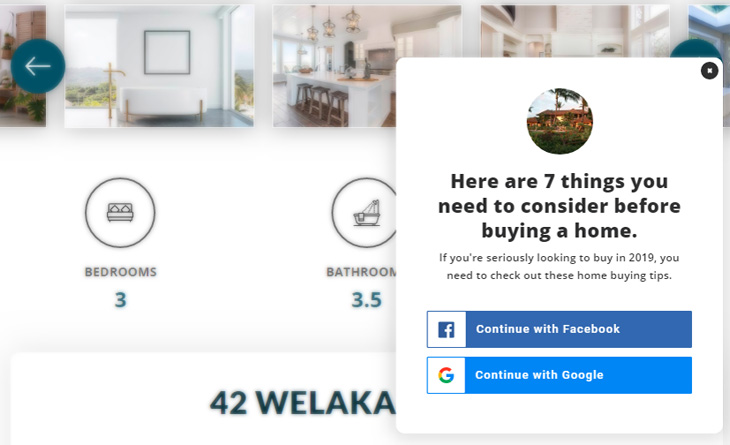Real estate copywriting tips to help you boost conversions by engaging visitors, building trust, and addressing client needs.
Branding & Design
Your real estate website might be attracting visitors, but are those visitors turning into leads? If your traffic isn’t converting, the issue often boils down to your copywriting. The words on your website have the power to engage, persuade, and drive action—or they can leave potential clients clicking away.
Effective real estate copywriting isn’t just about describing your services; it’s about making an emotional connection, demonstrating value, and guiding visitors toward the next step. Whether you’re crafting a homepage, listing description, or lead magnet, the right language can make all the difference.
In this guide, we’ll break down 10 essential real estate copywriting strategies that will help you engage your audience, build trust, and, most importantly, turn your website visitors into loyal clients.
1. Focus On The Client’s Needs, Not Yourself
One of the most common mistake real estate agents and brokerages make with their real estate copywriting is not making it client-centric enough.
That is to say, they talk too much about themselves and their business, and not about their client’s problems and goals.
Sure, it’s important to highlight your company’s award-winning business model or your unique approach to client service.
But if you don’t relate how that business model will help your client, then it’s going to come across as empty marketing jargon and gratuitous self-promotion.
But here’s the stone-cold truth: your website visitors don’t really care about you, or your business. They only care about what you can do for them. So make sure you tell them.

For a good example, take a look at Real Estate Creativ’s homepage. Their value proposition explicitly and succinctly states what they do: “Home buying and selling systems.” And they state the direct benefits to their clients are: “Save you money, time and provide a hassle free experience.”
Immediately the client understands what the direct value is to them. They don’t have to infer it or guess by reading about how great your business is. You should do the same with your website’s real estate copywriting.
Be direct, and focus on your clients’ needs.
If your value proposition mentions “we” or “I” more than it mentions “you” and “your”, then you may think about re-wording it to focus on the client, not your business.
2. Label The Client’s Problem To Demonstrate Empathy
Most realtors assume that they don’t need to state their clients’ needs. After all, it’s obvious, right?
…well, yes. It probably IS obvious.
But by stating it explicitly labeling said need, you’re showing that you understand where your clients are coming from. You’re demonstrating empathy.
Empathy builds trust, and clients only work with businesses that they trust.
You can’t afford to skip this step.

Colin Bray does a fantastic job. Right away on his home page, he addresses two of the main pain points from home sellers: how much money are they going to get, and how stressful the process will be.
And right below, on the “Looking to sell” box, he tells his clients how he’s going to help them. “You’ve got an award-winning Realtor who will work closely with you at every step of the process.”
If you can articulate the one major issue they’re looking to overcome, they will feel like you literally just peeked inside their brain and read their minds. And they won’t hesitate to reach out to you.
3. Show How Your Service Solves Their Problems
Labeling your clients’ problems alone isn’t enough. You need to connect that problem directly to the solution that your service offers.

Once again, Real Estate Creativ does a fantastic job here as well. For each pain-point they identify, they offer a solution with their service.
Doing so allows the client to imagine how great working with you would be, and how you are the answer to the problem that they’re facing.
By identifying their pain points and offering a valuable solution to each of them, you’re going to engage the client and let them know they’ve come to exactly the right place.
4. Avoid Technical Jargon And Marketing-Speak
Former screenwriter turned business guru Donald Miller has a saying that is relevant to all real estate agents looking to generate more leads…. “You confuse, you lose.”
Miller’s theory is that clients don’t choose the best services or products when making a purchasing decision. They choose the ones that are the easiest to understand.
You may think that technical industry terms and complex marketing jargon make you sound smart and professional. But the reality is, clients are turned off by needlessly complicated language.
Nobody wants to have to crack out an Oxford Dictionary just to understand what you’re offering. If your website’s real estate copywriting is overly jargony and covered in acronyms, they will simply move on to somebody else they can actually understand.

In this example from McLuhan Group, they use plain language in an easy, conversational style to communicate their unique approach to making sales.
It’s easy to understand and requires minimal cognitive effort. If you can communicate your value to clients in an easy to understand way, they’ll be much more likely to give you a call.
5. Make Your Copy Easily Scannable
Following on from the previous point, you also need to think about the perfect amount of copy that is required to compel your visitors to contact you.
It’s easy to assume that the more information you give your clients, the more value you’re providing, right?
Wrong.
In today’s fast-paced digital world, nobody has the time to read your marketing version of War and Peace. Walls of text are off-putting to visitors. Instead of driving engagements, they drive away visitors.
Visitors will almost never read your entire website. So craft your copy and lay it out in a way that is super easy to scan through.
Communicate only the most important information, and as precisely and succinctly as possible.

The Stones do a great job of breaking up their buyer and seller services’ copy. Not only does the copy go right to the point, but it also uses plenty of images to highlight their services.
6. Use Social Proof To Build Trust And Credibility
Humans are social animals. We look to others for approval and we look to others for reassurance when making a purchasing decision. Therefore social proof is an essential element of any real estate website copy.
Social proof can come in many forms, but you must have it. A common and effective form of social proof is client testimonials.
Nothing speaks to the service and credibility of your business better than the positive reviews of your past clients.
But as shown in these examples from Fathom Realty and Chase International, you don’t always have to just use testimonials.


Industry Awards, accreditations, press attention, endorsements, and impressive business statistics are all effective forms of social proof.
These can be weaved into your real estate copywriting to build trust, establish authority and help you to generate more leads from your website.
7. Give Them A Plan To Follow
Humans are master procrastinators. We love to put off the things we need to do, avoid making decisions and creating excuses for not taking action.
First-time buyers (and those that have dealt with less than stellar real estate agents) have the belief that the real estate process is super long, complicated and difficult. As such, they will use that perceived difficulty as an obstacle to getting in touch with you.
So, use your website’s real estate copywriting to counter this natural human instinct and inspire your visitors to take action.
Give your website visitors a simple roadmap of how the process of doing business with you will work out. That way they can see how easy it will be in advance and have less of an excuse to procrastinate.
Break the process down into three super-simple steps for them to follow that emphasize how easy doing business with you really is.

Real Estate Creativ does this in an outstanding way (I swear, they didn’t sponsor this article). Upon reading the example above no potential client could ever honestly come up with the excuse that it’s all too difficult.
It’s a simple and extremely effective way to encourage your visitors to contact you directly from your website.
8. Call The User To Action
Arguably the most important element in any website copy is the call to action (CTA).
The CTA is the place where you tell, or invite the visitor to take a certain action. Said action could be to visit another blog post, schedule a consultation, provide their email, visit your Facebook Business page, etc.
Don’t assume that users will automatically know how and when to contact you. You have to tell them, and you have to do so in a way that seems like the next logical step to take.
While it’s not a good idea to be pushy or aggressive, it’s ok to be assertive. People actually love having the uncertainty of knowing what to do next removed for them.

9. Explain The Risk Of Not Doing Business With You
Studies show that people are more sensitive to losing something of value than they are to gain something of value. This psychological tendency is known as loss aversion.
You can leverage the power of loss aversion in your website copy to inspire visitors to take the desired action.
Highlight for your users the stakes of not doing business with you. What does the client have to lose if they pass on this opportunity?

In this example from Hill Country Flat Fee Realty, they highlight the risks of giving away home equity and paying too much by choosing another company.
But don’t overuse this tactic. The overwhelming majority of your real estate website copy should be about the positive benefits to the client.
However, by showing your visitors what they could miss out on you’re increasing the chances they will be inspired to take action and get in touch to avoid that loss.
10. Reduce The Risk Of Engagement By Offering A Guarantee
The final tip for how to optimize your real estate copywriting for the maximum conversion is the tried and tested strategy of offering some form of guarantee or risk minimization to the visitor.
By offering some form of guarantee, you’re removing any potential excuse the visitor could come up with for not contacting you.

Ryan Coleman does this brilliantly with his Home Sold Guaranteed offer. He is demonstrating that he is so confident he can sell his client’s homes, that he actually offers to buy the property himself if he fails.
He reduces the risk to his clients by offering this guarantee. And as a result, his clients will be powerfully compelled to take him up on his offer.
Of course, you don’t need to take your guarantee quite that far. Other powerful forms of risk-reducing guarantees include offering free consultations, or money-back guarantees.
By reducing the perceived risk of engaging you, you’ll increase the number of visitors that contact you and turn into leads.
The Bottom Line
Never underestimate the power of great real estate copywriting. It can make a huge difference between truly connecting with your visitors, or scaring them off your site.
If you’re struggling with converting traffic into leads, do a review of your website’s real estate copywriting and see where you can improve things to increase your leads.
By implementing the ten real estate copywriting techniques we analyzed in this article, you’ll be able to inspire action among your visitors, and encourage them to turn into leads.
Did you find this article valuable? Share it with your friends and colleagues! And if you don’t want to miss any of our articles, subscribe to our newsletter. We publish articles like this one regularly in the morning, so you can improve your marketing skills over a fresh cup of coffee ☕.
And if you’re ready to become the ultimate hyperlocal real estate expert, book a demo with AgentFire today.
